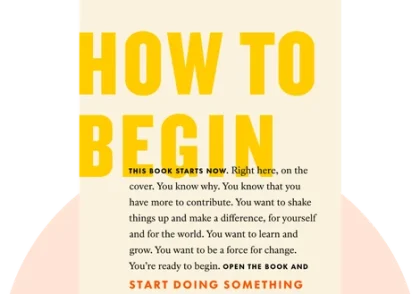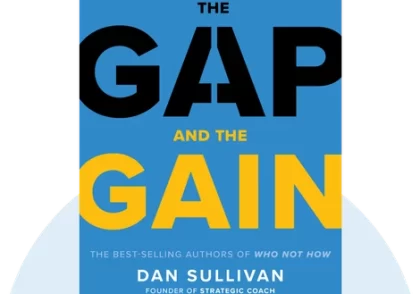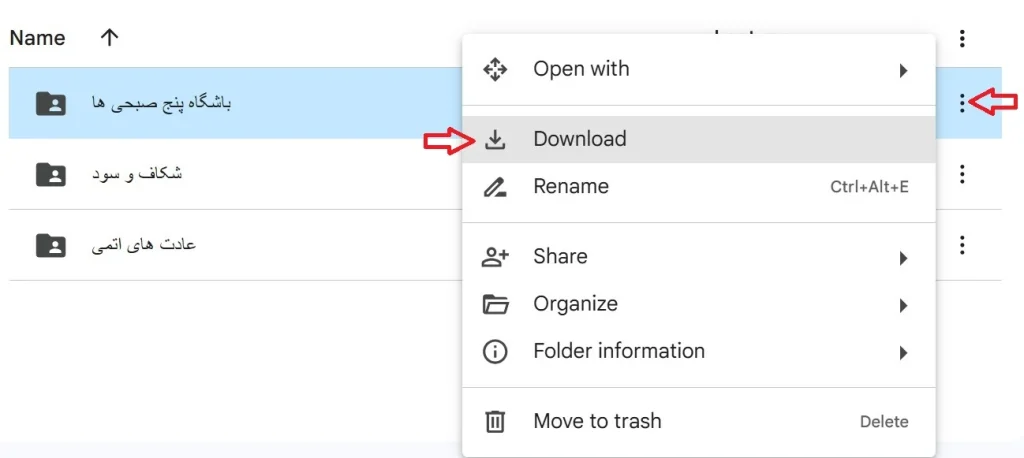- زمان مطالعه و تمرین: 20 + 15 دقیقه
- سطح انگلیسی: متوسط
اگه سطح زبانت مبتدیه:
اول نکات کلیدی بخش فارسی رو بخون. بعد از خوندن هر نکته، معادلش رو از توی بخش نسخه انگلیسی بررسی کن. اینجا میتونی همزمان صوت کتاب رو هم گوش بدی تا اینطوری ذهنت رابطه بین کلمات و مفهومشون رو سریعتر متوجه بشه
اگه سطح زبانت متوسطه:
بدون نگاه کردن به متون بخش فارسی یا انگلیسی، هر نکته کلیدی رو اول از طریق صوت کتاب گوش بده و بعد متن انگلیسی متناظرش رو بخون. در نهایت هم تمرین های بخش درک مطلب رو انجام بده و لغات مهم و اصطلاحات رو تمرین کن
اگه سطح زبانت قویه:
و میخوای خودتو به چالش بکشی فقط صوت کتاب رو گوش بده و مستقیم تست های بخش درک مطلب رو انجام بده

6 نکته کلیدی کتاب
ایده کلیدی ۱ از ۸
با یادگیری از افراد موفق و پذیرفتن مسئولیت زندگی، به موفقیت برسید.
تا حالا فکر کردید که چطور بعضی آدمها، با این که زمانشون مثل بقیهست، تونستن ثروت زیادی جمع کنن و حسابی موفق بشن؟ خب، بیشترش به خودکنترلی و انضباط شخصی برمیگرده، مخصوصاً توی سه بخش مهم زندگی: موفقیت فردی، شغل و خوشحالی کلی.
شما هم میتونید این کار رو انجام بدید، و بهترین راهش اینه که اول از همه توی موفقیت شخصیتون منظم و جدی باشید.
یکی از بهترین کارها برای این که توی مسیر موفقیت بیفتید، یاد گرفتن از آدمای خبره توی حوزهی کاریتونه. برید سراغ کنفرانسهاشون، کتابهاشون رو بخونید و پادکستهاشون رو گوش بدید.
مثلاً یه دندونپزشک توی سندیگو که نویسنده ازش یاد میکنه، هر کنفرانس دندونپزشکی که میتونست رو میرفت. توی یه کنفرانس توی هنگکنگ، یه دندونپزشک ژاپنی یه روش جدید معرفی کرد که ظاهر دندونا رو برای همیشه بهتر میکرد. این دندونپزشک آمریکایی سریع این روش رو یاد گرفت و توی کارش اجرا کرد. چند سال بعد، از سراسر آمریکا براش وقت میگرفتن که دندوناشونو درست کنه.
تا سن ۵۵ سالگی، به “دندونپزشکِ دندونپزشکها” معروف شد و اونقدر پول درآورد که راحت بازنشسته بشه.
بازنشستگی زودهنگام براتون جذابه؟ پس وقتشه که مسئولیت زندگیتون رو بپذیرید.
نویسنده خودش اینو به سختی یاد گرفت. وقتی ۲۱ سالش بود، توی کار ساختمونسازی کار میکرد و فقط به اندازهای پول درمیاورد که زنده بمونه. نه ماشین داشت، نه پسانداز، و توی یه آپارتمان کوچیک زندگی میکرد. اما یه روز به خودش اومد و فهمید که اگه میخواد زندگیشو تغییر بده، باید خودش دست به کار بشه. باید دست از سرزنش کردن کودکی سختش و نداشتن تحصیلات برمیداشت.
فردای اون روز، تصمیم گرفت سختتر کار کنه. شروع کرد به خریدن کتابهای خودسازی و زندگیشو وقف پیشرفت شخصی کرد. همین که تصمیم گرفت بهونهگیری رو بذاره کنار و دیگران رو مقصر ندونه، باعث شد که توی آینده موفق بشه.
ایده کلیدی ۲ از ۸
با روش هفتمرحلهای و گرفتن راهنمایی از افراد موفق، به هدفهاتون برسید.
چسبیدن به تصمیمهای سال نو کار راحتی نیست. توی ژانویه، کلی انگیزه دارید که مثلا هر روز بدوید یا سیگار رو ترک کنید. ولی تا میرسه به فوریه، میبینید که از دویدن جا میمونید و یواشکی یه نخ سیگار میکشید. چرا نمیتونیم به برنامهمون پایبند بمونیم؟
طبق گزارشی از USA Today، توی یه تحقیق فقط ۴ درصد از افراد تونستن به تصمیمهای سال نوی خودشون عمل کنن. اما نکته جالب اینه که ۴۴ درصد از اونهایی که موفق شدن، هدفهاشونو روی کاغذ نوشته بودن.
وقتی هدفهاتونو مکتوب میکنید، احتمال این که بهشون برسید خیلی بیشتر میشه. چون نوشتن باعث میشه حواسپرتیها کم بشه و تمرکزتون روی چیزای درست بره.
اگه میخواید از قدرت نوشتن استفاده کنید، روش هفتمرحلهای رو امتحان کنید:
مرحله ۱: مشخص کنید دقیقا چی میخواید. مثلا اگه هدفتون پول درآوردنه، دقیقاً بگید چقدر. اگه میخواید وزن کم کنید، بگید چند کیلو.
مرحله ۲: هدف مشخصتون رو بنویسید.
مرحله ۳: یه تاریخ مشخص برای رسیدن بهش تعیین کنید. اگه هدفتون بزرگه، اونو به چند مرحله کوچیکتر تقسیم کنید.
مرحله ۴: یه لیست از کارهایی که میتونید برای رسیدن به هدفتون انجام بدید بنویسید. موانع و چیزایی که باید یاد بگیرید هم توی لیست بیارید.
مرحله ۵: مهمترین کارها رو اولویتبندی کنید و توی تقویمتون بذارید. کارهای مهمتر رو زودتر انجام بدید.
مرحله ۶: همون لحظه کارتون رو شروع کنید. منتظر شرایط ایدهآل نمونید.
مرحله ۷: هر روز یه قدم کوچیک برای رسیدن به هدفتون بردارید.
علاوه بر این، از آدمای موفق مشورت بگیرید تا زودتر به هدفتون برسید.
مثلا باب بارتون، یکی از شرکتکنندههای سمینار نویسنده، دنبال پیشرفت توی شغلش بود. اون دقت کرد که افراد موفق توی شرکتش چطور لباس میپوشن و چطور حرف میزنن، و سعی کرد ازشون تقلید کنه.
ولی چیزی که واقعاً زندگیشو تغییر داد، این بود که از یکی از بهترین فروشندههای شرکت خواست یه کتاب خوب بهش معرفی کنه. اون فروشنده هم از این درخواست خوشش اومد و بعدش چندین کتاب و برنامه صوتی دیگه بهش پیشنهاد کرد. باب هم خودش رو مجبور کرد که بخونه و گوش بده، و همین باعث شد که بهترین فروشندهی شرکت بشه.
ایده کلیدی ۳ از ۸
ترسهاتونو با روبهرو شدن فوری و انجام “گزارش فاجعه” شکست بدید.
آیا ترس از شکست – مثل نداشتن درآمد کافی یا از دست دادن پولی که دارید – جلوی پیشرفتتون رو گرفته؟ اگه اینطوره، نگران نباشید! این ترسها توی مغز ما سیمکشی نشدهن؛ ما توی زندگی اونا رو یاد میگیریم. یعنی با کمی اراده، میشه یادشون رو هم از بین برد.
یه راه مؤثر برای غلبه بر ترسهاتون، انجام گزارش فاجعه (The Disaster Report) هست که شامل چهار مرحله میشه:
مرحله ۱: ترستون رو واضح و شفاف توصیف کنید.
مرحله ۲: بدترین حالتی که ممکنه پیش بیاد رو مشخص کنید. مثلا، شاید نمیخواید سرمایهگذاری کنید چون میترسید همهی پولتون رو از دست بدید. اما وقتی با ترسهاتون روبهرو بشید، دیگه اینقدر بزرگ و ترسناک به نظر نمیان.
مرحله ۳: راهحلهایی برای بدترین حالت پیدا کنید. مثلا، فرض کنید واقعا پولتون رو از دست دادید. خب که چی؟ همیشه میتونید یه کار پیدا کنید و دوباره پول دربیارید. خیلی از ترسها به این خاطره که حاضر نیستیم با بدترین سناریو روبهرو بشیم، ولی وقتی این کارو میکنید، میبینید که اونقدرها هم وحشتناک نیست.
مرحله ۴: هر کاری که میتونید انجام بدید تا از اتفاق افتادن اون بدترین حالت جلوگیری کنید. وقتی حسابی درگیر بهتر کردن اوضاع باشید، دیگه وقتی برای نگرانی باقی نمیمونه.
یه راه دیگه برای کنار اومدن با ترسهاتون اینه که عادت کنید فوراً باهاشون روبهرو بشید.
مثلا، یکی از شرکتکنندههای سمینار نویسنده، توی محل کارش مشکل داشت. رئیسش مدام سرزنشش میکرد و تحقیرش میکرد، با این که اون یکی از بهترین کارمندای شرکت بود. کمکم این باعث شد که از روبهرو شدن با رئیسش بترسه.
اما بعد از این که از نویسنده مشورت گرفت، یاد گرفت که چطور باید با این ترسش برخورد کنه. دفعهی بعد که رئیسش سرزنشش کرد، همون جملهای رو که نویسنده بهش یاد داده بود گفت:
“لطفاً اینطوری با من صحبت نکنید. ممنون میشم که محترمانهتر برخورد کنید. وقتی احساساتم جریحهدار بشه، نمیتونم تمرکز کنم و کارم رو به خوبی انجام بدم.”
واکنش رئیسش چی بود؟ اون عذرخواهی کرد و دیگه هیچوقت بیدلیل سرزنشش نکرد! از اون به بعد، نهتنها از رئیسش متنفر نبود، بلکه از کارش هم بیشتر لذت میبرد.
ایده کلیدی ۴ از ۸
چه برای خودتون کار کنید، چه برای یه شرکت، انضباط شخصی کلید موفقیته.
میدونستید که ۸۰ درصد از ثروت دنیا توی دست ۲۰ درصد از جمعیت جهانه؟ خوشبختانه، توی کشورهای غربی مثل آمریکا، جابهجایی درآمدی خیلی بالاست. یعنی اگه سخت کار کنید، میتونید از طبقهی پایین اقتصادی به طبقهی بالا برسید.
اگه برای یه شرکت کار میکنید، باید توی هر کاری که بهتون سپرده میشه، بهترین عملکردتون رو نشون بدید.
مثلا نویسنده، وقتی توی یه شرکت توسعهی املاک کار میکرد، همیشه از رئیسش درخواست کارای بیشتری میکرد و خودش رو مجبور میکرد که اونا رو سریع و عالی انجام بده. این کار باعث شد که بهش لقب “آدم همهفنحریف” بدن!
یه بار رئیسش ازش خواست که به رِنو بره تا کار روی یه پروژهی جدید رو شروع کنه. پیشنهاد رئیس این بود که توی یکی دو هفتهی آینده بره، ولی نویسنده بلیطش رو برای فردای همون روز گرفت.
وقتی سریعتر دستبهکار شد، تونست با وکیل و مهندس پروژه ملاقات کنه و متوجه شد که زمین موردنظر دسترسی به آب نداره و اصلاً قابل ساختوساز نیست! بنابراین قرارداد رو فسخ کرد. اگه این کارو نکرده بود، شرکتش ۲ میلیون دلار ضرر میکرد!
رئیسش تحتتأثیر قرار گرفت و کمتر از یک سال بعد، نویسنده مدیر ۴۲ نفر از کارمندان شرکت شد.
اما اگه کسبوکار خودتون رو دارید، باز هم باید سخت کار کنید تا به هدفتون برسید.
به این نکته توجه کنید که یه صاحب کسبوکار، بهطور متوسط ۵۹ ساعت در هفته کار میکنه. این کار نیاز به اراده و بهبود مداوم داره. برای این که خودتون و کسبوکارتون موفق بشید، میتونید از فرمول CANEI استفاده کنید، که مخفف Continuous And Never-Ending Improvement یعنی “بهبود مستمر و بیپایان” هست.
چطوری؟
وقتی یه کسبوکار راه میندازید، اولین کاری که میکنید، نوشتن یه طرح تجاری (business plan) هست که توش بازار هدف، قیمتگذاری، استراتژیهای بازاریابی و… رو مشخص میکنید. اما این طرح یه چیز ثابت و غیرقابلتغییر نیست! مهم نیست که الان چقدر خوب پیش میرید، همیشه باید در حال بهبود باشید.
در واقع، هر سال باید برنامهی کاریتون رو بازبینی و بهروز کنید تا بتونید با رقبا و نیازهای مشتریها همگام بمونید.
باید بدونید که موفقیت در کسبوکار، اونم با رشد مداوم، ماهها یا حتی سالها کار سخت و ساعتهای طولانی میطلبه.
ایده کلیدی ۵ از ۸
با فرمول یک درصد به آزادی مالی برسید و با روش A B C D E اهمالکاری رو شکست بدید.
تا حالا تصور کردید که کاملاً آزاد مالی باشید؟ یعنی فقط از سود پساندازهاتون زندگی کنید، به سفر برید و کارایی رو که دوست دارید انجام بدید. قشنگه، نه؟ خب، این هدف کاملاً ممکنه، فقط کافیه از یه سری ابزار استفاده کنید.
اولین قدم برای رسیدن به آزادی مالی، تمرین “لذت بردن با تأخیر” هست، و “فرمول یک درصد” دقیقاً همینو بهتون یاد میده.
کافیه ۱ درصد از درآمدتون رو پسانداز کنید و با ۹۹ درصد باقیمونده زندگی کنید. مثلا اگه ماهی ۳۰۰۰ دلار درآمد دارید، ۱ درصدش فقط ۳۰ دلار میشه.
اگه همیشه دخلوخرجتون برابره یا حتی کلی بدهی دارید، باز هم این روش برای شما کاربردیه. وقتی یاد بگیرید که با ۹۹ درصد درآمدتون زندگی کنید، میتونید پسانداز رو به ۲ درصد، بعد ۳ درصد و همینطور بیشتر افزایش بدید.
هر ماه یاد میگیرید که کمتر خرج کنید و بیشتر ذخیره کنید. با این کار، علاوه بر اینکه بدهیاتون رو تسویه میکنید، پول و ثروت بیشتری هم جذب خواهید کرد.
اما برای موفقیت مالی، باید اهمالکاری رو کنار بذارید. اینجاست که روش A B C D E به کمک شما میاد!
چطوری کار میکنه؟
هر روز صبح، یه لیست از همهی کارایی که باید انجام بدید، بنویسید. بعد اونا رو بر اساس این روش اولویتبندی کنید:
✅ A: کارای “حتماً باید انجام بشه” که عواقب سنگینی دارن اگه انجامشون ندید.
✅ B: کارای “بهتره انجام بشه” که عواقب سبکتری دارن اگه انجام ندید.
✅ C: کارای “اگه انجام بدید خوبه”، ولی اگه انجام ندید هیچ اتفاق خاصی نمیافته.
✅ D: کارایی که میتونید به دیگران بسپارید تا وقتتون برای کارای مهمتر آزاد بشه.
✅ E: کارایی که ضرورتی ندارن و باید حذف بشن!
🔺 یه قانون مهم: قبل از انجام کارای با اولویت پایین، باید همهی کارای مهمتر رو تموم کنید.
اولش سخت به نظر میرسه، ولی اگه این کار رو انجام بدید، فوراً بهرهوری و درآمدتون دو برابر میشه!
ایده کلیدی ۶ از ۸
با ورزش کردن و حذف “سه سفید” از رژیم غذایی، زندگی سالمتری داشته باشید.
این روزا، آدمها بیشتر از هر زمان دیگهای عمر میکنن، و هیچ دلیلی وجود نداره که شما یه زندگی طولانی و سالم نداشته باشید. اما چطوری؟ یکی از رازهاش داشتن یه سبک زندگی سالمه، که یعنی ورزش کنید و درست غذا بخورید.
برای کنترل وزن، از رژیم کاهش وزن “تفکر بزرگ” پیروی کنید که روی حذف “سه سفید” تمرکز داره:
❌ شکر رو حذف کنید – یعنی دیگه خبری از دسرهای شیرین، نوشابه و حتی قند چای یا قهوه نباشه.
✅ این کار باعث میشه روزانه تقریباً نیم کیلو وزن کم کنید و سطح انرژیتون بره بالا.
❌ نمک رو کنار بذارید – برای کاهش وزن دائمی، نمک اضافه رو از غذاتون حذف کنید.
❌ آرد سفید رو ترک کنید – یعنی نان، کیک، شیرینی و پاستاهای تهیهشده از آرد سفید رو نخورید.
این روش کاملاً جواب میده! یه مرد ۳۲ ساله از فلوریدا که سالها مشکل کاهش وزن داشت، با این برنامه توی ۶ ماه، ۱۰ کیلو وزن کم کرد! علاوه بر تغییر ظاهری، اعتمادبهنفسش بالا رفت و روابط اجتماعی بهتری پیدا کرد.
اما فقط تغذیه سالم کافی نیست، باید ورزش رو هم شروع کنید.
هیچوقت برای ورزش کردن دیر نیست!
مثلاً یه خانم ۶۸ ساله که توی یه مرکز سالمندان زندگی میکرد، هیچوقت ورزش نکرده بود، تا اینکه یه روز مصاحبهای با دوندگان همسن خودش دید.
همون لحظه تصمیم گرفت یه ماراتن رو تموم کنه!
فردای اون روز، کفش مخصوص خرید، چندتا کتاب درباره دویدن خوند و شروع کرد به پیادهروی دور محلشون.
🔹 نتیجه؟ بعد از یک سال، یه مینیماراتن رو تموم کرد و تا سن ۷۵ سالگی، دو تا مسابقهی ۸۰ کیلومتری رو با موفقیت پشت سر گذاشت!
ایده کلیدی ۷ از ۸
با اختصاص زمان بیشتر به خانواده و تمرین بخشش، روابط شخصیتون رو بهبود بدین.
وقتی والدین میشید، بچهها اولویت اصلی زندگیتون میشن. اما بزرگترین حسرتی که خیلی از پدر و مادرها دارن چیه؟
اینکه وقتی بچههاشون کوچیک بودن، وقت کافی براشون نذاشتن!
اما شما این قدرت رو دارید که کارها و تعهدات غیرضروری رو حذف کنید و تبدیل به یه والد فوقالعاده بشید.
🔹 از امروز تصمیم بگیرید که وقت بیشتری برای خانوادهتون بذارید.
مثلاً یکی از دوستای نویسنده ۵ روز در هفته گلف بازی میکرد و زمستونا هم مرتب به سفرهای گلف میرفت.
حتی بعد از ازدواج و داشتن ۴ تا بچه، باز هم هفتهای چند بار گلف بازی میکرد.
همسرش از این وضعیت ناراضی بود و بالاخره بهش اعتراض کرد.
🔹 نتیجه؟ اون تصمیم گرفت مسئولیتپذیرتر باشه و تعداد دفعات بازی گلف رو به هفتهای یکبار کاهش داد.
🔸 نتیجهی این کار؟ علاوه بر اینکه پدر و همسر بهتری شد، خودش هم حس بهتری داشت!
برای خوشبختی بیشتر، باید یاد بگیرید که ببخشید.
خیلی از آدمها سالها کینهی والدینشون رو به دل میگیرن به خاطر اشتباهاتی که دههها پیش مرتکب شدن.
🔹 اونها مدام از دوران بچگیشون شکایت میکنن و ازش به عنوان توجیهی برای شکستهاشون استفاده میکنن.
❌ اما تا وقتی یاد نگیرید که ببخشید، هیچوقت آرامش ذهنی نخواهید داشت.
✅ با تمرین بخشش، خودتون رو از بار سنگین احساسات منفی آزاد کنید و اجازه بدید خوشبختی و آرامش واقعی رو تجربه کنید.
ایده کلیدی ۸ از ۸ – خلاصه نهایی
📌 پیام اصلی این کتاب:
همیشه در زمینهی تخصصی خودتون به دنبال یادگیری بیشتر باشید.
این یعنی مطالعهی کتابها، گوش دادن به پادکستها و شرکت در سمینارهای متخصصان.
🚫 به دنبال میانبُر نباشید.
✅ رسیدن به اهداف بزرگ، به خودانضباطی، تلاش زیاد و مواجههی درست با ترسها نیاز داره.
🔹 با این روش، میتونید به آزادی مالی و رضایت بیشتری در زندگی برسید.
یه توصیهی کاربردی:
💰 ۳٪ از درآمدتون رو روی خودتون سرمایهگذاری کنید.
طبق تحقیقات انجمن آموزش و توسعهی آمریکا، شرکتهای موفق ۳٪ از درآمدشون رو به رشد و توسعهی کارکنانشون اختصاص میدن.
✅ پس اگه سالانه ۵۰ هزار دلار درآمد دارید، حداقل ۱۵۰۰ دلار رو برای یادگیری مهارتها و دانش جدید هزینه کنید.
🔸 این کار در درازمدت، چندین برابر براتون سودآور خواهد بود!
نسخه انگلیسی
Key idea 1 of 8
Achieve success by learning from experts and accepting responsibility for your life.
Have you ever wondered how certain individuals, though allotted no more time than most people, manage to accumulate vast wealth and achieve great success? Well, it’s mostly a matter of self-discipline applied to the three fundamental areas of life: personal success, careerand overall happiness.
You can do this, too. And it’s best to start by becoming disciplined about your personal success.
A great way to do that is to learn from the experts in your field. Attend their conferences, read their books and listen to their podcasts.
Just consider the author’s San Diego-based dentist. He attended every dental conference he could, and, at a conference in Hong Kong, he learned a technique that transformed his career. At the conference, a Japanese dentist shared a new procedure that permanently improved the appearance of teeth. The author’s dentist immediately began implementing this new technique, and within a few years, clients from all across the United States were booking treatments at his clinic.
By the age of 55, he was known as a “dentist’s dentist” and had earned enough money to retire.
Is the thought of early retirement appealing to you? Well, then it’s time to accept responsibility in your life.
The author learned this the hard way. When he was 21, he worked in construction, earning just enough money to get by. He had no car, no savings and lived in a tiny apartment. Then he had an epiphany: he had to take responsibility and change his life. He had to stop blaming his problems on his childhood and lack of education.
The very next day, he began working harder. He also started buying self-help books and dedicating his life to self-improvement. His conscious decision to no longer make excuses or blame others played an important role in his future success.
Key idea 2 of 8
Accomplish your goals by adopting the Seven-Step Method and following advice from successful people.
It’s hard sticking to New Year’s resolutions. In January, you’re dedicated to whatever you’ve resolved to do – be it taking a daily jog or quitting smoking. Come February, you find yourself skipping scheduled runs and sneaking forbidden smokes. So why can’t we stick to the program?
USA Today reported that, in one study, a mere 4 percent of participants followed through with their resolutions. However, of those who did manage to stick to their resolutions, 44 percent wrote the resolution down.
Committing your goals to paper makes it much likelier that you’ll achieve them; the simple act of writing out what you want minimizes distractions and focusses your energy in the right areas.
To cash in on the power of the pen (and paper!), use the Seven-Step Method to achieve your goals:
Step 1: Decide what you want and be specific. If you want to accumulate more wealth, decide on exactly how much money you want. Or if you want to lose weight, determine exactly how many pounds you wish to shed.
Step 2: Write down your specific goal.
Step 3: Set a date by which you think you could accomplish it. Be realistic. If it’s a large goal, break it down to sub-deadlines.
Step 4: Write down a list of everything you could possibly do to achieve your goal. This includes listing the obstacles that you’ll face and the additional knowledge and skills you’ll need to achieve it.
Step 5: Prioritize the most beneficial tasks and add them to your calendar. Your most important tasks should be completed first.
Step 6: Start on your tasks right away.
Step 7: Do something every day that helps you achieve your goal.
In addition to employing the Seven-Step Method, ask for advice on how to achieve your goals more quickly.
To demonstrate the effectiveness of seeking advice, consider the story of Bob Barton, one of the author’s seminar attendees. Bob wanted to get ahead in his career. He paid close attention to how the senior salespeople at his company talked and dressed, and made a conscious effort to imitate them.
This helped, but it wasn’t until he asked one of the top salespeople to recommend a book that he really started to see results. They were flattered that he asked them and continued to recommend more books and audio programs. By disciplining himself to read and listen to them, Bob became the best salesperson in the office.
Key idea 3 of 8
Conquer your fears by facing them immediately and by completing The Disaster Report.
Is your fear of failure – like not earning enough money or losing what cash you do have – holding you back from reaching your potential? If so, don’t fret: such fears aren’t hardwired into our brains. They’re learned during life, which means that, with a little willpower, they can be unlearned.
An effective aid to overcoming your fears is The Disaster Report, which is comprised of four steps.
Step 1: Describe your fear clearly.
Step 2: Determine the worst-case scenario. Are you holding back from investing because you’re afraid that you’ll lose all your money in the process? When you confront your fears, they gradually become manageable instead of dominating your thoughts and feelings.
Step 3: Find solutions for the worst-case scenario. For example, say youdidlose money in the process. Big deal! You can always find a job and earn it back. Fear often stems from an unwillingness to consider the worst possible outcome, so it really does help to confront it.
Step 4: Do everything in your power to ensure the worst-case scenario doesn’t play out. Not only will you be so busy making sure that the worst thing doesn’t happen; you also won’t have any time to worry.
Another way to overcome your fears is to train yourself to deal with them straight away.
For instance, one of the author’s seminar participants was unhappy at work because her boss kept criticizing and belittling her, even though she was a top employee. It’s no wonder that she slowly became afraid of interacting with her boss.
After receiving advice from the author, however, she knew how to deal with the situation. The next time her boss berated her, she repeated what the author had advised her to say: Please don’t talk to me like that. I’d appreciate being spoken to differently. When my feelings are hurt, I can’t focus on my work or do as good of a job.
How did her boss react? Well, he apologized and never unfairly criticized her again. From that point on, she no longer resented her boss or her job.
Key idea 4 of 8
Whether you’re self-employed or work for a company, self-discipline is crucial to success.
Did you know that 80 percent of global wealth is owned by 20 percent of the global population? Fortunately, in Western countries such as the United States, there is high income mobility. That means it’s possible to move from the lower-income brackets to the higher ones through hard work.
So, if you work for a company, you should do your best at whatever work your boss delegates to you.
This is what the author sought to do when he worked at a property-development company. He would ask his boss for more responsibility and discipline himself to complete the task as quickly and as well as he could. This earned him a reputation as the “go-to guy.”
His boss once asked him to go to Reno to start developing the property of a company they’d bought. But instead of flying out within a couple of weeks, as suggested, the author booked a flight for the next day.
He immediately met with the lawyer and engineer, eventually discovering that the property had no access to water and could not be developed. He terminated the contract, which would otherwise have ended up costing his company $2 million!
His boss was impressed and, within a year, the author was promoted, managing 42 employees in the company.
Now, if you have your own business, you’ll also need to work hard if you want to achieve your goals.
Bear in mind that the average business owner works 59 hours every week. This requires willpower and constant improvement, so, to help you and your business succeed, try using the CANEI formula, which stands for Continuous And Never-Ending Improvement.
This is how it works:
When you start a new business, one of the first things you do is write up a business plan detailing your target market, pricing, marketing strategies and so on. But this business plan isn’t set in stone. Regardless of how successfully your business is performing today, it’s crucial that you continuously improve it. Indeed, you should revise and update it on a yearly basis to keep up with your competition and customers’ needs.
You need to keep in mind that running a successful, constantly improving business requires months, or even years, of working long hours.
Key idea 5 of 8
Reach financial freedom via the One Percent Formula and conquer procrastination with the A B C D E Method.
Imagine a life of complete financial freedom. You live off the interest from your savings – spending all your time traveling and engaging in your favorite activities. Sounds dreamy! The good thing is this goal is achievable if you’re willing to apply certain tools.
The first step toward financial freedom is practicing delayed gratification, and the One Percent Formula is here to help you do just that.
Simply force yourself to start saving 1 percent of your income and discipline yourself to live off the remaining 99 percent. So, say you earn $3,000 per month; 1 percent is just $30.
And if you’re like most people who live paycheck to paycheck or have accumulated a large amount of debt, the One Percent Formula is still a realistic goal. As soon as you learn to start living off the remaining 99 percent, you can increase your savings ratio to 2 percent, and so on.
Each month, you’ll train yourself to consciously spend less and save more. And as you move toward financial independence, you can even pay off any debt you have and begin to attract more wealth.
Then you must overcome procrastination by applying the A B C D E Method of prioritizing.
To start doing this, you need to write out a list of all the tasks you have to complete at the beginning of each day. Then prioritize them by following the A B C D E Method. The only rule is that you shouldn’t complete a lower-value task before completing all the higher value tasks first. It takes a great deal of discipline to choose your most important tasks and start on them immediately, but the following steps will assist in instantly doubling your productivity and earnings.
Under A, list your “Must do” tasks – those that hold major consequences if uncompleted.
Under B, write your “Should do” tasks, which have mild consequences if uncompleted.
C tasks are “Nice to do” activities, which have no consequences if uncompleted.
D tasks should be delegated to others so you can focus on the more important jobs.
And, lastly, E tasks aren’t essential to your goals and should be eliminated.
Key idea 6 of 8
Live a healthier life by getting into the habit of exercising and avoiding the “three whites” in your diet.
These days, people are living longer than ever before, and there’s no reason you shouldn’t live a long and meaningful life, too. The big question is how to do this. One of the key ingredients is having a healthy lifestyle, and that means eating well and exercising.
You can take control of your weight by following the author’s Thinking Big weight-loss program, which is centered around avoiding the “three whites”: sugar, salt and flour.
First, you should eliminate all sugars from your diet. That means no sugary desserts, no soft drinks and no more sugar in your morning coffee. This should help you shave off one pound per day and boost your energy levels. Next, for permanent weight loss, you should stop adding salt to your meals.
And, lastly, eliminate white-flour products such as breads, pastries and pasta from your diet.
It really does work. Just six months after starting the Thinking Big program, a 32-year-old man from Florida who had been struggling to lose weight managed to drop 22 pounds. Not only did he look different, he also felt happier and more confident and attracted more dates than ever before.
On top of eating healthily, you should realize that it’s never too late to start exercising.
The perfect example of this is a 68-year-old woman who lived in a senior-citizens home. She’d never really been into exercise, but then she watched an interview featuring marathon runners her age.
Right then and there, she decided that she also wanted to complete a marathon. The very next day, she bought running shoes, invested in running books and started walking around her local neighborhood.
At the end of the first year, she was able to complete a mini-marathon, and by the time she reached 75, she’d finished two 50-mile cross-country marathons.
Key idea 7 of 8
Improve your personal relationships by making more time for your family and practicing forgiveness.
When you become a parent, your children become your priority. But can you guess one of the biggest regrets expressed by parents? That they didn’t spend enough time with their children when they were young. However, you have the power to cut back and get rid of other commitments that get in the way of you becoming the best parent possible.
Start by making a decision today to spend more time with your family.
Just consider one of the author’s friends, a man who used to play golf five days per week and who took frequent golfing holidays in the winter. Even after getting married and having four kids, he continued to play golf several times a week. As you can imagine, his wife wasn’t happy with his lack of familial commitment, and she confronted him about it.
Consequently, he made a conscious decision to be responsible and reduce his golfing to once a week. This decision not only made him a better father and husband; it made him happier, too.
On the path to happiness, you also need to learn to forgive others.
This is perhaps most common when people harbor resentment toward their parents for something they did many decades ago. Such people complain about their childhood experiences and use them as an excuse for their failures.
The only way you can reach peace of mind is through the discipline of forgiveness. By developing the habit of forgiving those who have hurt you in the past, you free yourself from the emotional baggage that holds you back from happiness.
Key idea 8 of 8
خلاصه نهایی
The key message in this book:
You should always strive to learn more in your chosen field. This includes reading books, listening to podcasts and attending seminars by experts. Don’t waste your time with shortcuts. Achieving your goals requires great self-discipline and hard work, as well as dealing with your fears as they arise. Do this, and you can achieve financial freedom and more overall happiness.
Actionable advice:
Invest 3 percent of your income in yourself.
According to the American Society for Training and Development, 3 percent is the percentage that profitable companies invest in their employees’ self-development. If you make $50,000 every year, decide to put at least $1,500 toward improving your knowledge and skills. It’ll pay off in the long run.
لغات مهم
accumulate (əˈkjuːmjəˌleɪt) – اَکیومیُلِیت
Definition: To gradually collect or gather something over time.
Persian Translation: جمع کردن، اندوختن
Example: Over the years, he accumulated a great deal of wealth.
Persian Translation: او طی سالها ثروت زیادی جمع کرد.
epiphany (ɪˈpɪf.ə.ni) – اِپِفِنی
Definition: A sudden realization or discovery.
Persian Translation: لحظهٔ شهود، درک ناگهانی
Example: She had an epiphany about her career while traveling.
Persian Translation: او هنگام سفر، ناگهان در مورد مسیر شغلیاش به درک روشنی رسید.
procrastination (proʊˌkræs.tɪˈneɪ.ʃən) – پِروکرَستینِیشِن
Definition: The act of delaying or postponing tasks.
Persian Translation: تعلل، به تعویق انداختن
Example: Procrastination can prevent you from reaching your goals.
Persian Translation: تعلل میتواند مانع رسیدن شما به اهدافتان شود.
delegate (ˈdɛl.ɪ.ɡeɪt) – دِلِگِیت
Definition: To assign tasks or responsibilities to others.
Persian Translation: واگذار کردن، محول کردن
Example: A good manager knows how to delegate tasks effectively.
Persian Translation: یک مدیر خوب میداند چگونه وظایف را به طور مؤثر واگذار کند.
discipline (ˈdɪs.ɪ.plɪn) – دیسیپلین
Definition: The ability to control yourself and stay focused on your goals.
Persian Translation: انضباط، خودکنترلی
Example: Self-discipline is key to success in any field.
Persian Translation: انضباط شخصی کلید موفقیت در هر زمینهای است.
resilience (rɪˈzɪl.jəns) – رِزیلیِنس
Definition: The ability to recover quickly from difficulties.
Persian Translation: انعطافپذیری، تابآوری
Example: Resilience helps people overcome challenges in life.
Persian Translation: تابآوری به افراد کمک میکند تا بر چالشهای زندگی غلبه کنند.
flattered (ˈflæt.ərd) – فِلَتِرد
Definition: Feeling pleased because someone has praised you.
Persian Translation: احساس خوشحالی کردن به خاطر تعریف دیگران
Example: She was flattered when her teacher praised her work.
Persian Translation: وقتی معلمش از کار او تعریف کرد، احساس خوشحالی کرد.
consequences (ˈkɒn.sɪ.kwənsɪz) – کانسِکوئِنسیز
Definition: The results or effects of an action.
Persian Translation: عواقب، پیامدها
Example: Not studying will have serious consequences for your exams.
Persian Translation: درس نخواندن عواقب جدی برای امتحانات شما خواهد داشت.
forgiveness (fərˈɡɪv.nəs) – فُرگیوْنِس
Definition: The act of letting go of anger or resentment toward someone.
Persian Translation: بخشش، گذشت
Example: Forgiveness can bring peace and happiness to your life.
Persian Translation: بخشش میتواند آرامش و شادی را به زندگیتان بیاورد.
implement (ˈɪm.plɪ.ment) – ایمپلیمِنت
Definition: To put a plan or decision into action.
Persian Translation: اجرا کردن، پیادهسازی کردن
Example: The company implemented a new training program for employees.
Persian Translation: شرکت یک برنامه آموزشی جدید را برای کارمندان اجرا کرد.
اصطلاحات و عبارتهای کاربردی
“Have you ever wondered…?”
Usage: This phrase is used to introduce a question about something that might have crossed someone’s mind before. It is often used in discussions or presentations to engage the listener.
Persian: آیا تا به حال به این فکر کردهاید که …؟ این عبارت برای مطرح کردن سؤالی درباره چیزی که ممکن است قبلاً به ذهن کسی رسیده باشد، استفاده میشود.
Example:
Have you ever wondered how some people become rich so quickly?
آیا تا به حال فکر کردهاید که بعضیها چطور خیلی سریع ثروتمند میشوند؟
“A great way to do that is…”
Usage: This structure is used to introduce a suggestion or a recommended method for achieving something.
Persian: یک راه عالی برای انجام این کار این است که… این عبارت برای پیشنهاد دادن یک روش مفید استفاده میشود.
Example:
A great way to learn English is to watch movies with subtitles.
یک راه عالی برای یادگیری انگلیسی این است که فیلمها را با زیرنویس ببینید.
“By the age of…”
Usage: This phrase is used to talk about something that happens before or by a certain age.
Persian: تا سنِ … این عبارت برای بیان چیزی که تا یک سن مشخص اتفاق افتاده باشد، استفاده میشود.
Example:
By the age of 55, he had enough money to retire.
تا سن ۵۵ سالگی، او به اندازه کافی پول داشت که بازنشسته شود.
“The very next day…”
Usage: This phrase emphasizes that something happened immediately on the day after another event.
Persian: دقیقاً روز بعد… این عبارت برای تأکید بر اینکه چیزی دقیقاً روز بعد از یک اتفاق رخ داده، استفاده میشود.
Example:
The very next day, he started working harder.
دقیقاً روز بعد، او سختتر کار کردن را شروع کرد.
“It’s no wonder that…”
Usage: This phrase is used to express that something is not surprising because of the circumstances.
Persian: جای تعجب نیست که… این عبارت برای بیان این است که یک اتفاق کاملاً قابل پیشبینی بوده است.
Example:
He never studied, so it’s no wonder that he failed the exam.
او اصلاً درس نخواند، پس جای تعجب نیست که در امتحان رد شد.
“It really does work.”
Usage: This phrase is used to emphasize that something is effective and produces results.
Persian: واقعاً جواب میدهد. این عبارت برای تأکید بر مفید بودن یک روش یا ایده استفاده میشود.
Example:
Try this method for learning new words. It really does work!
این روش را برای یادگیری کلمات جدید امتحان کن. واقعاً جواب میدهد!
“Another way to…”
Usage: This phrase introduces an alternative method or approach to do something.
Persian: یک راه دیگر برای… این عبارت برای معرفی یک روش جایگزین استفاده میشود.
Example:
Another way to improve your speaking skills is to talk to native speakers.
یک راه دیگر برای تقویت مهارت صحبت کردن این است که با افراد بومی صحبت کنید.
“Start by…”
Usage: This phrase is used to introduce the first step of a process or a recommended beginning action.
Persian: شروع کنید با… این عبارت برای معرفی اولین مرحله از یک فرایند استفاده میشود.
Example:
Start by making a list of your daily tasks.
با تهیه یک لیست از کارهای روزانه خود شروع کنید.
“This requires…”
Usage: This structure is used to explain that something needs a certain condition, skill, or effort.
Persian: این نیاز به … دارد. این عبارت برای توضیح دادن شرایط یا مهارتهای موردنیاز برای انجام کاری استفاده میشود.
Example:
Running a business requires patience and hard work.
اداره یک کسبوکار نیاز به صبر و تلاش دارد.
“Make a conscious decision to…”
Usage: This phrase means to deliberately choose to do something with full awareness.
Persian: بهطور آگاهانه تصمیم بگیرید که… این عبارت برای بیان انتخابی که با قصد و هدف انجام میشود، استفاده میشود.
Example:
He made a conscious decision to spend more time with his family.
او بهطور آگاهانه تصمیم گرفت که زمان بیشتری را با خانوادهاش بگذراند.
تست درک مطلب
1. Multiple Choice (MCQ):
What does the speaker mean by “It really does work”?
a) It works, but not very well.
b) It is completely useless.
c) It is effective and produces results.
d) It is difficult to use.2. Fill in the Blank:
“Have you ever ________ how some people become successful so quickly?”3. True or False:
“The very next day” means something will happen after a long time.4. Matching:
Match the phrases with their meanings.It’s no wonder that…
Another way to…
By the age of…
Start by…
a) To introduce an alternative method.
b) To begin something with a first step.
c) To express that something is not surprising.
d) To talk about something happening before a certain age.5. Rewriting:
Rewrite this sentence using informal spoken English:
“Running a business requires patience and hard work.”6. Open-ended Question:
In your own words, explain what “Make a conscious decision to…” means.7. Sentence Order:
Put the words in the correct order to make a proper sentence:
“to / English / a / great / movies / subtitles / learn / watch / way / is / with.”8. Choose the Correct Word:
“It’s important to (make / do / take) a list before starting a big project.”9. Error Correction:
Find the mistake and correct it:
“He never study, so it’s no wonder that he failed the test.”10. Short Answer:
What does “The very next day” emphasize in a sentence?Answer Key:
c) It is effective and produces results.
wondered
False
1-c, 2-a, 3-d, 4-b
“Running a business takes patience and hard work.”
It means to decide to do something on purpose, with full awareness.
“A great way to learn English is to watch movies with subtitles.”
make
“He never studies, so it’s no wonder that he failed the test.”
It emphasizes that something happened immediately on the next day.
نسخه اصلی کتاب + فایل صوتی Blinkest
راهنمای دانلود و استفاده
بعد از منتقل شدن به صفحه دانلود، روی سه نقطه کنار پوشه ی کتاب مورد نظرت کلیک کن و گزینه دانلود رو انتخاب کن تا تمامی فایل ها دانلود بشن. بعضی از کتاب ها نسخه خریداری شده مخصوص مطالعه Epub هستن. برای مطالعه این کتاب ها نیاز به نرمافزار های کتاب خوانی مثل Moon Reader داری
بنظرت مفید بود؟
روی ستاره ها بزن
میانگین امتیازات 4 / 5. تعداد رای: 16
فعلا کسی امتیاز نداده
پست های مرتبط

14 آذر 1403

21 مرداد 1403

21 مرداد 1403





دیدگاهتان را بنویسید